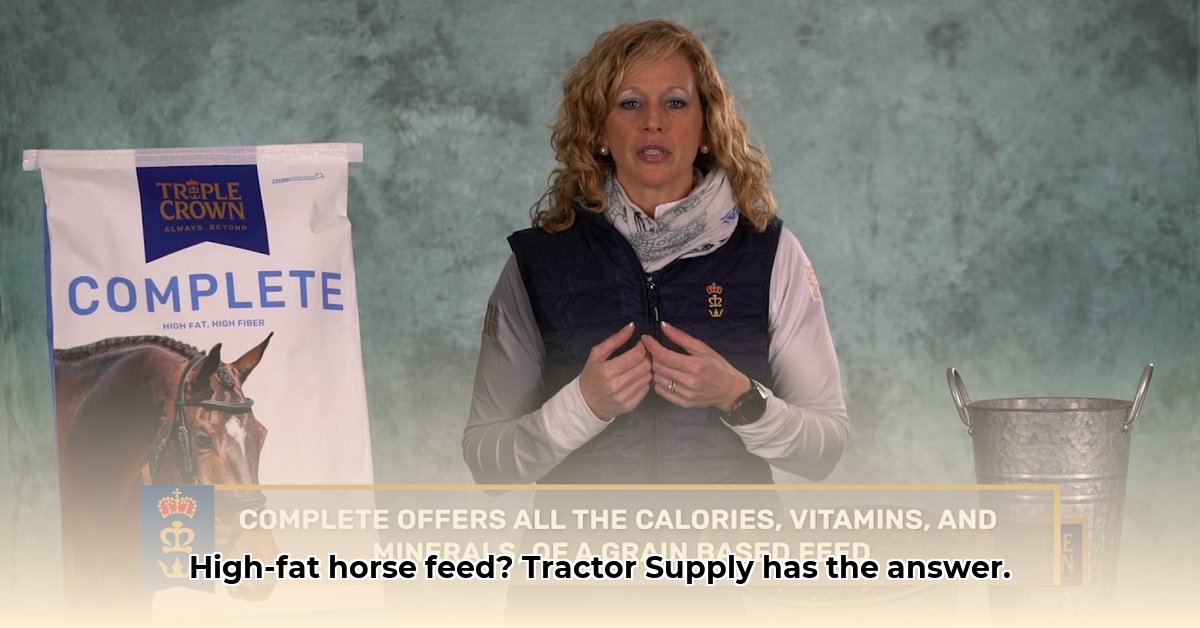
Keeping your horse healthy and thriving involves more than just affection; it requires mindful decisions about their nutrition and its environmental impact. High-fat horse feed can be crucial for horses needing extra energy or recovering from illness, and Tractor Supply offers a range of options. For other animal feed options, check out Tractor Supply's other feeds. This guide helps you select the best high-fat feed while minimizing your environmental footprint. We'll cover selecting the right feed, sustainable storage, responsible manure management, and long-term strategies for eco-conscious horse care.
Understanding the Need for High-Fat Horse Feed
High-fat horse feed provides concentrated energy, beneficial for horses with high energy demands, such as working horses, those recovering from illness, or those needing weight gain. Fat is a readily available energy source, easier to digest than large quantities of grain. However, excessive fat can cause digestive issues. Moderation is key. The appropriate high-fat feed depends on your horse's age, activity level, breed, health status, and even climate. Consulting your veterinarian is crucial for determining the optimal diet for your horse's unique needs. They may recommend blood work to assess your horse's overall health and guide your dietary choices. Isn't it vital to ensure your horse receives the right nutrients without compromising their health?
Tractor Supply's High-Fat Feed Options: A Comparative Look
Tractor Supply offers various high-fat feeds. When comparing products, consider:
| Product Name (Example) | Key Ingredients | Price Range (approx.) | Pros | Cons | Sustainability Considerations |
|---|---|---|---|---|---|
| Brand X Senior Formula | Oats, flaxseed, alfalfa, rice bran, vegetable oil | $25-$35 per 50lb bag | High fiber, suitable for older horses, easily digestible. | May not be suitable for young, high-energy horses. | Prioritize locally sourced ingredients; check packaging for sustainability details. |
| Brand Y Performance Mix | Corn, barley, soybean meal, added fat supplement | $30-$40 per 50lb bag | High energy, ideal for working horses, contains essential vitamins. | Could be too high in calories for some horses; potential weight gain. | Consider ingredient transportation distances; look for recycled packaging. |
| Brand Z Weight Gain Blend | Beet pulp, molasses, vegetable oil, fortified with minerals | $28-$38 per 50lb bag | Excellent for weight gain, palatable, supports healthy digestion. | Higher sugar content; unsuitable for insulin-resistant horses. | Evaluate ingredient origin; choose sustainably packaged options. |
Note: Prices and availability are estimates and may vary. Always check your local Tractor Supply for current information. Don't be swayed solely by marketing; scrutinize the ingredient list for quality and a balanced nutritional profile tailored to your horse's needs.
Sustainable Practices: Eco-Friendly Horse Feeding
Adopting sustainable practices benefits both your horse and the environment. Here's how:
1. Local Sourcing: Prioritize locally sourced hay and grains to reduce transportation emissions and support your local agricultural community. Engage with local farmers; ask about their farming methods to ensure they align with your sustainability values.
2. Smart Storage: Proper storage minimizes waste. Keep feed in a cool, dry, and well-ventilated area, protected from pests and moisture. Use airtight containers to maintain freshness and prevent spoilage. Did you know that proper storage can extend the lifespan of your feed by up to 20%?
3. Manure Management: Composting horse manure reduces landfill waste and creates nutrient-rich fertilizer. Explore anaerobic digestion for biogas production, converting waste into a renewable energy resource. Consult local authorities on appropriate manure disposal methods.
4. Decoding Feed Labels: Understand the guaranteed analysis (protein, fat, fiber, etc.) to make informed choices. Compare values between products to optimize nutrition and minimize waste. This empowers you to make cost-effective and sustainable decisions.
Long-Term Sustainability Strategies: A Holistic Approach
Sustainable horse feeding extends beyond individual feed choices. Consider:
- Grow your own forage: If feasible, growing your own hay reduces reliance on commercially produced feed, offering control over quality and sustainability.
- Partner with local farmers: Collaborate with local farmers committed to sustainable practices, fostering a reliable supply of high-quality feed and strengthening community ties.
- Optimize Feed Intake: Careful management and the right feed can reduce overall feed consumption, minimizing waste and associated expenses.
By integrating sustainable practices, you contribute to a healthier planet while ensuring your horse's well-being. Every action, no matter how small, makes a difference.